
About Course
Nowadays, to succeed in business, it is not enough to use marketing approaches. It is required to apply modern efficient methods of management to stream processes, such as logistics. Logistics as a practical activity steadily found its niche in the management of modern enterprises; it has great importance for the customers, suppliers of the company, its owners and shareholders. This science coordinates all structures of the company. Logistics can be considered as a tool for getting the products and services where they are needed and when they are desired. It is difficult to accomplish any marketing or manufacturing without logistical support. It involves the integration of information, transportation, inventory, warehousing, material handling, and packaging. The operating responsibility of logistics is the geographical repositioning of raw materials, work in process, and finished inventories where required at the lowest cost possible. Logistics can be defined as having the right quantity at the right time for the right price. Promptness is of utmost importance, as delayed delivery can result in significant losses to the recipient of the consignment in most cases. This course will help the participants to understand main concepts of this powerful tool and learn how to successfully apply it on practice.
Two days Training : 28/10/2025 – 29/10/2025
Brochure
— Course Fee: RM 1,780.00 (Inclusive of 8% Service Tax) —
Student Ratings & Reviews
